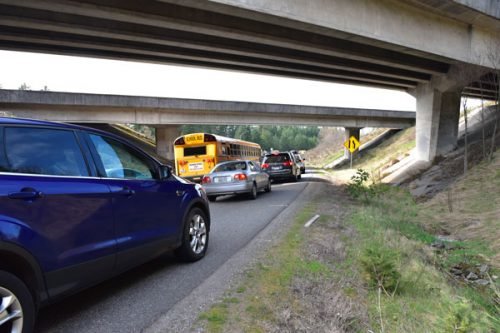 Zipper merging as practiced at Purdy. Photo: David Zeigler, KP News
Zipper merging as practiced at Purdy. Photo: David Zeigler, KP News
Bills would mandate better driving habits and prevent Narrows Bridge toll increases.
Two transportation bills introduced in the Washington State House of Representatives may impact KP residents commuting on Highway 16.
House Bill 1614 aims to teach Washington drivers proper merging techniques, and was inspired by a traffic snarl that lies close to home for KP residents. The bill, introduced by Rep. Chris Gildon (R-Tacoma) and Rep. Jesse Young (R-Gig Harbor), would require “zipper merging” to be taught in driver’s education and require questions on merging techniques on driving tests.
Zipper merging means entering a new lane at the last possible moment, with cars from each lane taking turns, integrating the lanes in a “zipper” motion. This contrasts with what is referred to as “early merging,” where drivers merge into the continuing lane as early as legally possible.
Young said his inspiration for the bill came from the northbound Highway 16 exit onto State Route 302 in Purdy, a space that the Washington State Department of Transportation has designated a “high accident corridor” due to “vehicle queueing.” Shoulder driving is allowed during afternoon commute hours but, according to Young, drivers are having a hard time merging back to a single lane where the shoulder narrows.
“The people that would take the option to go on the shoulder and merge at the merge point were viewed as cutters,” said Young at a House Transportation Committee meeting in late February. “People weren’t using it effectively, and that’s what really generated the idea behind the bill.”
Zipper merging has been endorsed by other states including Minnesota, where a state DOT study determined that the process could reduce the length of a traffic backup by up to 40 percent.
Critics suggest that this ideal scenario is rare. “What makes zipper merges fail more often than not isn’t how they’re designed, but both human selfishness and altruism,” said one typical WSDOT Facebook post. “That one extra car that wants to shove its way in more often causes a lane to come to a complete stop, which ruins the whole system.”
HB 1614 was referred to the transportation committee where it received a “do pass” recommendation.
Another bill that may affect Key Peninsula residents in the upcoming months is House Bill 1928, a measure to freeze tolls on the Tacoma Narrows Bridge by appropriating state funds. HB 1928 is sponsored in part by Rep. Michelle Caldier (R-Port Orchard).
Because of lower-than-expected traffic levels across the bridge, the state’s Transportation Commission has determined that approximately $35 million will be required to prevent toll hikes on the bridge until the project is paid off in 2031. If the money can’t be found, a 25-cent toll increase will go into effect July 1 of this year, followed by more toll hikes in the years to come.
This isn’t the first time the House has taken steps to curb toll increases on the Narrows bridge. In 2018, it passed a bill approving loans from the state, limiting toll increases to 25 cents. Since the funds provided were only loans, however, tolls would continue until 2032 to pay off the extra debt. HB 1928 proposes to make up the difference with appropriations instead, which unlike loans do not need to be paid back to the state. This plan would prevent the tolls from lasting longer or growing higher, but would shift the cost to all of Washington, not just Tacoma-area commuters.
“Toll-bearers in our district are bearing quite a burden,” said Rep. Christine Kilduff (D-University Place), one of the bill’s sponsors. Kilduff said the Narrows bridge payment plan was unfair compared to other transportation projects, where the state assumes more of the financial responsibility. “One hundred percent of toll revenues go to pay off the debt on the (Narrows) bridge itself. Other projects, like State Route 520, that figure is around the 72 percent range.”
At press time, HB 1928 is still in Transportation Committee hearings.
UNDERWRITTEN BY THE FUND FOR NONPROFIT NEWS (NEWSMATCH) AT THE MIAMI FOUNDATION, THE ANGEL GUILD, ADVERTISERS, DONORS AND PEOPLE WHO SUPPORT INDEPENDENT, NONPROFIT LOCAL NEWS